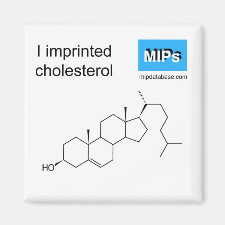
Authors: Zhang SZ, Zheng M, Deng F, Xie Q, Ma X
Article Title: Preparation of cholesterol imprinted polymerized organogel and selectivity adsorption ability.
Publication date: 2011
Journal: Acta Polymerica Sinica
Issue: (4)
Page numbers: 390-394.
DOI: 10.3724/SP.J.1105.2011.10094
Alternative URL: http://www.gfzxb.org/EN/Y2011/V0/I4/390
Abstract: N-octadecyl maleamic acid (ODMA) as gelator self-assembled in solvent mixture of β-hydroxyethyl methacrylate, methylacrylic acid and polyethylene glycol dimethacrylates-200 in the presence of 3-cholesteryloxycarbonylpropanoic acid (COPA) as template molecule,and turned them into thermally reversible polymerizable organogels.The resultant organogels were subsequently polymerized by in situ UV irradiation.The molecularly-imprinting polymerized organogels were obtained after removal of the template molecules through acetonitrile extracting.The cholesterol molecularly imprinted polymerized organgels (MIPO) showed significantly higher affinity for cholesterol than that for non-imprinted polymerized organgels (NIPO) in water/THF mixture (5:6, V/V).The selectivity experiment indicated that the adsorption amount of MIPO for cholesterol (18.9 mg/g) was higher than that for stigmasterol (4.5 mg/g) and testosterone (3.6 mg/g) within 3 h since the selectivity was based on the specific binding of cholesterol to recognition sites formed in polymers.The adsorption capacity for cholesterol onto MIPO was found to increase and then decrease,but for stigmasterol and testosterone which was decreased with the increase of ODMA in organogel.The higher concentration of COPA in organogel would result the decrease of the adsorption capacity for cholesterol,but the adsorption capacity for stigmasterol and testosterone remained nearly constant. However,these results could be attributed to the high density of polymer network and stability of imprinted holes.
Template and target information: 3-cholesteryloxycarbonylpropanoic acid, COPA, cholesterol
Author keywords: organogels, molecular imprinting, cholesterol, selectivity adsorption



Join the Society for Molecular Imprinting

New items RSS feed
Sign-up for e-mail updates:
Choose between receiving an occasional newsletter or more frequent e-mail alerts.
Click here to go to the sign-up page.
Is your name elemental or peptidic? Enter your name and find out by clicking either of the buttons below!
Other products you may like:
 MIPdatabase
MIPdatabase









